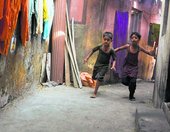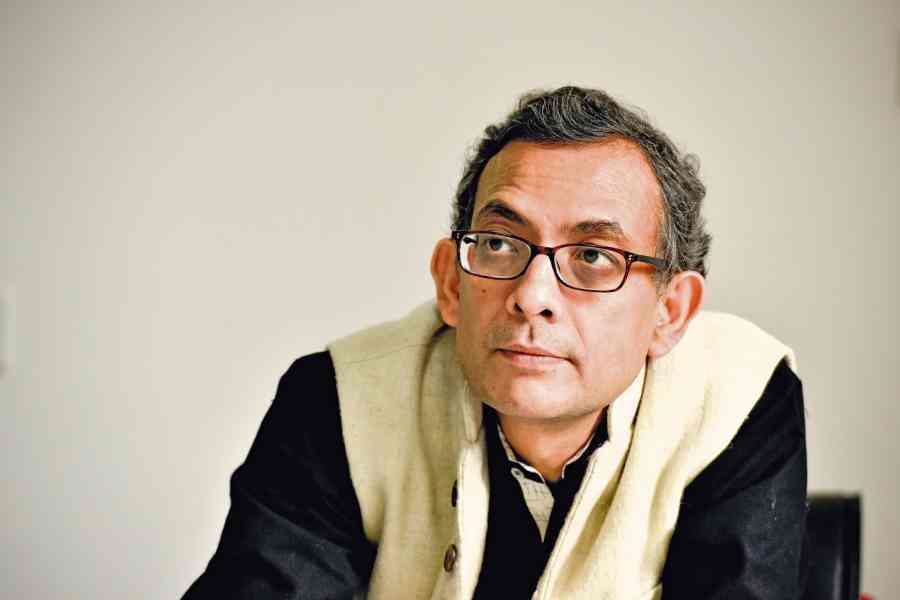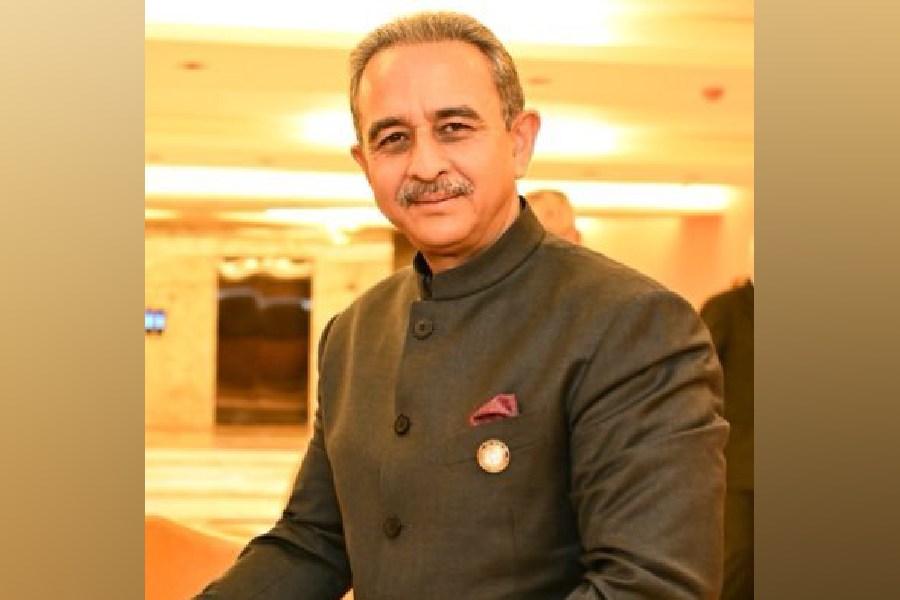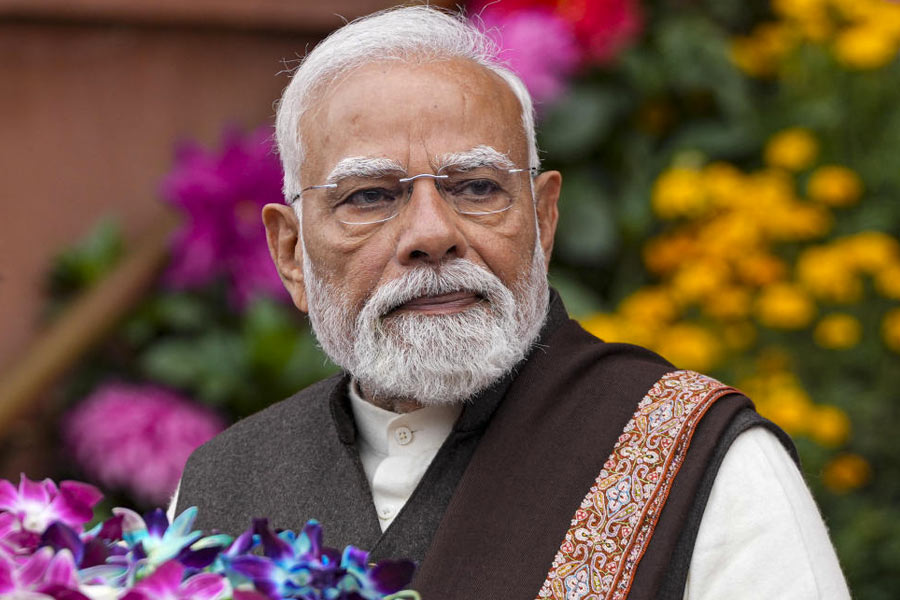 |
| One path in Slumdog Millionaire (picture from the movie), another for Shabana Khatun |
Shabana Khatun wakes up at an hour that divides night from day. From the window in her room, she watches the sky change colour. It isn’t time for the morning prayers yet. She pulls up her cover to her chin, closes her eyes and tries to imagine how the new day would unfold.
In a few hours, on hearing her mother’s rasping voice, she would be up, tidying up the room and helping her rustle up breakfast — leftover rotis, sabzi and tea only when anything is left over. There is no uncertainty about the morning chores, though. Cleaning, cutting vegetables, perhaps even cooking. The one possibility of departure from routine dangles from the mouth of the mohalla tap from where she fetches the day’s water. It’s not always there.
Shabana cannot think any further. Outside, near the tap and around it, lies a world that is called Bibibagan, named after she knows not whose beloved Bibi or why a central Calcutta slum should be crowned thus. Perhaps there was a garden here once. From the sky now it looks a maze of criss-crossing, narrow lanes with low-roofed houses and open drains — a sight brought within reach by Slumdog Millionaire to those who haven’t seen one in real life.
|
In one such hovel lives Shabana, 17, with her mother, Rehana, and her brother, Javed, who, at 23, works in a shoe factory, bringing home Rs 400 a week. Her father, Akhtar Hussein, is often in between jobs, but is now on a lucky streak, earning Rs 600 a week at a Topsia factory.
She doesn’t quite know if Bibibagan, where her family pays Rs 35 per month for the one room that is theirs, is a slum recognised by the Calcutta Municipal Corporation, or a jhupri, an illegal squatter settlement of over 500 people whose collective address is 10 Bibibagan.
Her thoughts keep straying back to the water tap, one of three that provide water to these people. A clock bought with money pooled in by the slumdwellers hangs near the tap, its hands counting the five minutes each family gets to fill their pipas (small drums). Water spurts intermittently, for two hours each in the morning and at evening, even as a queue of 20-25 men and women waits.
On some days, the water drops to a trickle; then stops altogether. On these mornings, the snaking line hisses with anger and abuse. At the worst of times, fights break out, and the police come blowing their whistles to enforce an uneasy silence.
Shabana hasn’t seen Slumdog but she can well imagine the situation where the boy keeps sitting on the throne while a fat man with his heavy bowels knocking desperately at the door begs to be let into the public toilet. For the 500-plus residents of 10 Bibibagan, there are three community toilets. What’s this with the number three: three taps, three toilets?
That’s also the number of electrical appliances in her home: two lights and a fan, for which the family pays Rs 160 a month. But there is light, though not enough perhaps to provoke fantastic thoughts of escape.
If every individual is under an invisible yet bright spotlight, Shabana’s circle contains herself and her fellow denizens of this squalor. As a volunteer for Childline, which works for the protection and rights of children, she teaches a group of 15 in their homes, introducing them to the alphabet and educating them about health and their rights. A 17-year-old girl counselling children and, occasionally their mothers, about health, contraception, HIV-AIDS, sexually transmitted diseases and child abuse defies accepted codes of slumgirl behaviour.
“Shuru shuru mein mushkil hota tha lekin baad mein sab theek ho gaya (In the beginning, I found it difficult, but things became all right later).”
It’s not all bad, is it? Swarnalata, who works with Cini Asha, an NGO engaged in protecting the rights of deprived children, says sub-agents of absentee landlords often threaten families with eviction. Shabana’s landlord, who lives in Bihar, is an occasional visitor and often has to be coaxed to collect rent in a Slumdoggish touch of fantasy.
The fantasy, in fact, doesn’t end. Shabana could’ve been one of the 13.6 to 19 million children in the age group of 6-14 who don’t go to school in India. She studied at a local school till Class IX, but in December last year, her father lost his job and she had to stop. Not for long. Shabana convinced her mother that she needed to continue to study and, against the wishes of some family members, enrolled herself at the Adi Ballygunge Vidyalay in Park Circus as an external student. The Rs 10 that would otherwise be needed to travel to school was saved.
Shabana will appear for her Madhyamik examination this year and though her father now has a job, the Rs 200 tuition fee per month is still hard to spare. She gives lessons in her locality and helps her mother make straps for bags at Rs 10 for every 1,000 pieces. Each rupee is a step closer to college where she intends to go one day, though not quite the rush of Benjamin Franklin greenbacks at the Taj Mahal.
Some day she would also like to become a lawyer. “Duniya se nainsaafi hatana hai (To remove injustice from the world).”
What if her mother wants to get her married? “Unko mana lenge, pehli baar jaise (I will make her change her mind like the last time).”
Knowledge disturbs the boundaries of beliefs and strictures that once looked inviolable. Shabana draws strength from her faith to survive her daily battles but she has questions too. She wonders why the women in her family, including her mother, have to cover themselves when they step out. Or why she isn’t allowed to talk to boys of her age.
“Mere nazron mein ye galat hai. Agar hum dil se sachche hain, to koi kasoor nahin (In my eyes, this is incorrect. If my heart is pure, there should be no problem).”
What she has seen of the other sex doesn’t inspire her much anyway. Neither is she impressed with the practice of talaq. Her mother had told her that a neighbour’s husband had once uttered the word thrice to his wife and, though anger had given way to remorse later, what had been done with such ease could only be undone by paying a maulvi to be allowed to maintain conjugal ties.
Marital ties, even unbroken ones, are skewed in favour of men. Neha, a friend, had eloped and married a man who did not take good care of her. Shabana wouldn’t want to share her fate. “Mujhe apni mehnat se sakoon ki zindagi jeena hai (I want to live a peaceful life by dint of hard work).”
Tiny rooms, violent neighbours and parched taps are not the only elements squeezing her existence. She lives among people who crowd her life and make it look even smaller: her relatives searching for a groom, the neighbourhood women sneering at her and her books and even community elders who would scoff at her if she were to run free with her friends from one serpentine lane to another.
Shabana hasn’t seen Slumdog but she did watch Chak De! India, in which hockey girls conquered the world. But Sitara Khatun and Ambiya Khatun succeeded too — girls from Bibibagan who now work with a social organisation and have a life on which a different spotlight shines.
As she walks back towards home, Shabana lifts her burqa over her head but leaves her face uncovered in an unhurried gesture. This day in February is her birthday. “Aaj mera birthday hai,” she had said earlier, taking care to pronounce birthday correctly.
Fantasies will never cease. Happy birthday, Shabana.











